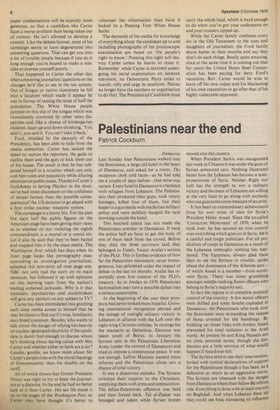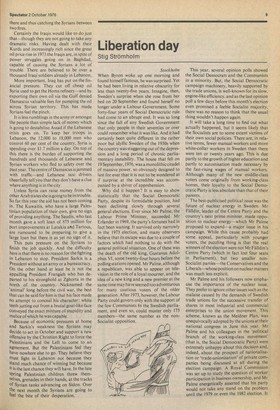Palestinians near the end
Patrick Cockburn
Damascus
Last Sunday four Palestinians walked into the Semiramis, a large old hotel in the heart of Damascus, and asked for a room. The reception clerk told them—as he had told me a couple of days before--that none was vacant. Every hotel in Damascus is crammed with refugees from Lebanon. The Palestinians then produced their guns, took ninety hostages, killed four of them, lost their leader in a gun battle with the Syrian military police and were publicly hanged the next morning outside the hotel.
This botched attack has not made the Palestinians popular in Damascus. It took the police half an hour to get the body of one of them back from the crowd. Before they died the three survivors said they belonged to Fatah, Yasser Arafat's section of the PLO. This is further evidence of how far the Palestinian movement, never homogeneous, has splintered under the impact of defeat in the last six months. Arafat has reportedly even lost control of the PLO's treasury. As in Jordan in 1970 Palestinian factionalism may turn a possible defeat into a certain catastrophe.
At the beginning of the year their pros pects had never looked more hopeful. Growing international recognition abroad and the mirage of outright military victory in Lebanon in alliance with the Left over the right-wing Christian militias. In revenge for the massacre at Qarantina, Damour was taken south of Beirut. In January the Syrians sent in the Palestinian Liberation Army (under the control of Damascus) and tried to impose a compromise peace. It was not enough. Leftist Muslims wanted more reforms and the Palestinian ultras saw a chance of total victory.
It was a disastrous mistake. The Syrians switched their support to the Christians, supplying them with arms and ammunition. The leftist-Palestinian offensive was held and then forced back. Tal al-Zaatar was besieged and taken while Syrian troops moved into the country.
When President Sarkis was inaugurated last week in Chtaura it was under the guns of Syrian armoured cars. Nothing illustrated better how far Lebanon has become a semiprotectorate of Syria. Neither Right nor Left has the strength to win a military victory and the mass of Lebanese are willing at the very least to go along with anybody who can guarantee some measure of security.
It has been an extraordinary achievement from his own point of view for Syria's President Hafez Assad. Since the so-called 'Corrective Movement' of 1970, when he took over, he has secured an iron control over everything which goes on in Syria. He is a careful and tough politician. For all predictions of coups in Damascus as a result of the Lebanese imbroglio nothing has happened. The Egyptians, always glad these days to see the Syrians in trouble, spoke about the dominance of the Allawite sect— of which Assad is a member—from northwest Syria. There was some grumbling amongst middle-ranking Sunni officers who belong to Syria's majority sect.
In fact the regime is in complete political control of the country. A few senior officers were shifted and some bombs exploded in Damascus: the Palestinians who took over the Semiramis were demanding the release of those arrested for the bombings. BY building up closer links with Jordan Assad prevented his total isolation in the Arab world. At present he and King Hussein are on close personal terms, though the Jordanians are a little nervous of what would happen if Assad ever fell.
The Syrians tend to see their intervention, larded with cynical declarations of support for the Palestinians though it has been, as a defensive as much as an aggressive move. The Syrians are obsessed with the danger from Damascus where their fellow Ba'athists rule. Everything is done with at least one eye on Baghdad. And when Lebanon blew UP they could see Iraq increasing its influence
there and thus catching the Syrians between two fires.
Certainly the Iraqis would like to do just that—though they are not going to take any dramatic risks. Having dealt with their Kurds and increasingly rich since the great oil price rise in 1973 the Iraqis are, in spite of power struggles going on in Baghdad, capable of causing the Syrians a lot of trouble. There are believed to be over a thousand Iraqi soldiers already in Lebanon.
More important, Iraq has put on the financial pressure. They cut off cheap oil Syria used to get the Horns refinery—and by exporting their own oil via the Gulf denied Damascus valuable fees for pumping the oil across Syrian territory. This has made Syrians feel the pinch.
It is less rumblings in the army or amongst the people than simple lack of money which is going to destabilise Assad if the Lebanese crisis goes on. To keep her troops in Lebanon, the 12,000 to 18,000 men who control 60 per cent of the country. Syria is spending over $1.7 million a day. On top of this there is the burden of supporting the hundreds and thousands of Lebanese and Syrian workers who fled to safety over the Past year. The centre of Damascus is jammed with traffic—and Lebanese taxi drivers cheerfully tell you that they don't have a clue where anything is in the city.
Unless Syria can raise money from the other Arab states she is going to be in trouble. So far this year the aid has not been coming in. The Kuwaitis, who have a large Palestinian population of their own, give no sign of providing anything. The Saudis, who last month gave a soft loan of 875 million for Port improvements at Latakia aAd Tartous, are rumoured to be preparing to give a large loan but there is as yet no sign of it.
This puts pressure on the Syrians to finish the job quickly. And the difficulty here is that there is no reason for the fighting in Lebanon to stop. President Sarkis is a President without an army or a bureaucracy. On the other hand at least he is not the appalling President Frangieh who has departed to his stronghold at Zghorta in the north of the country. Nicknamed the 'animal' long before the civil war, the best that can be said for him is that his face made no attempt to conceal his character: white teeth jutting out from a brutal goat-like face conveyed the exact mixture of stupidity and malice of which he was capable.
Because of economic pressures at home and Sarkis's weakness the Syrians may decide to act in October and support a new offensive by the Christian Right to force the Palestinians and the Left to come to an agreement. But the Palestinians feel they have nowhere else to go. They .believe they must fight in Lebanon not because they stand much chance of winning but because '(is the last chance they win have. In the late Spring Palestinian children threw themselves, grenades in their hands, at the tracks of Syrian tanks advancing on Sidon. Over the next month the Syrians are going to feel the bite of their desperation.



































 Previous page
Previous page